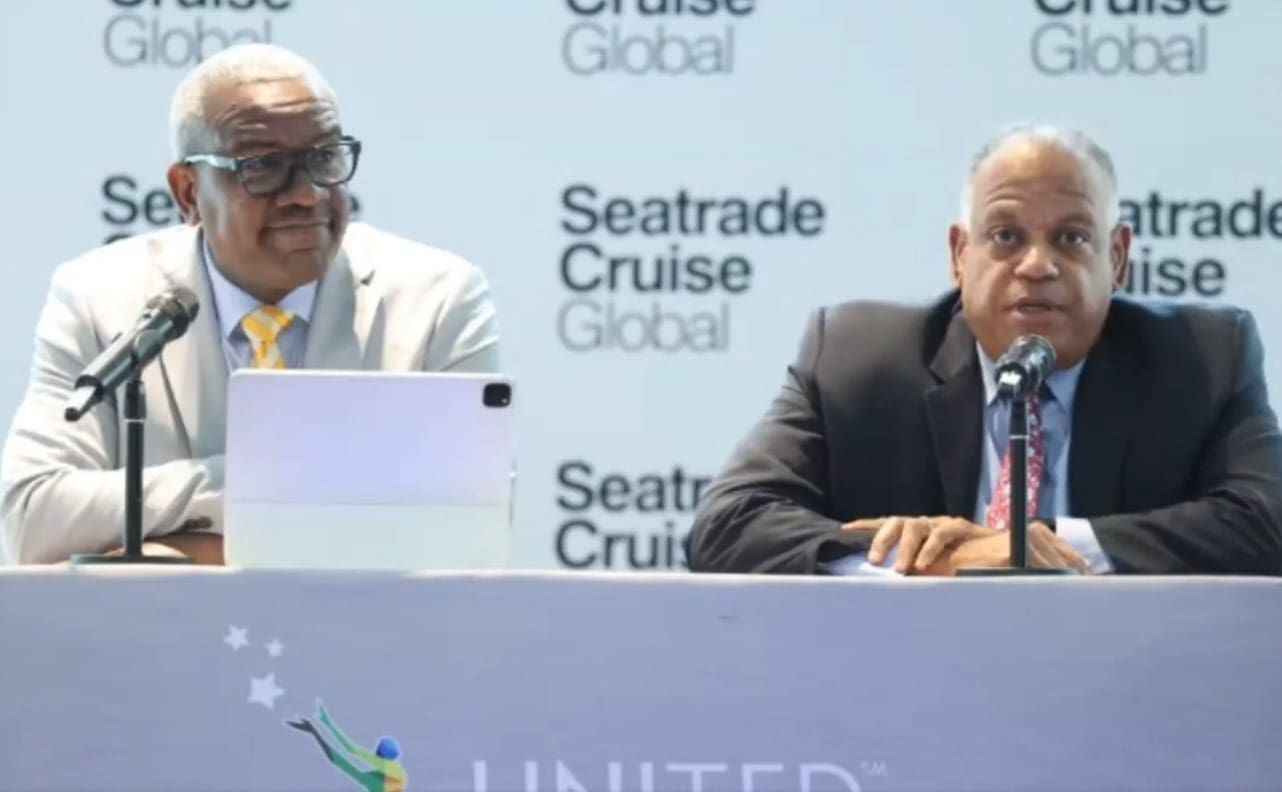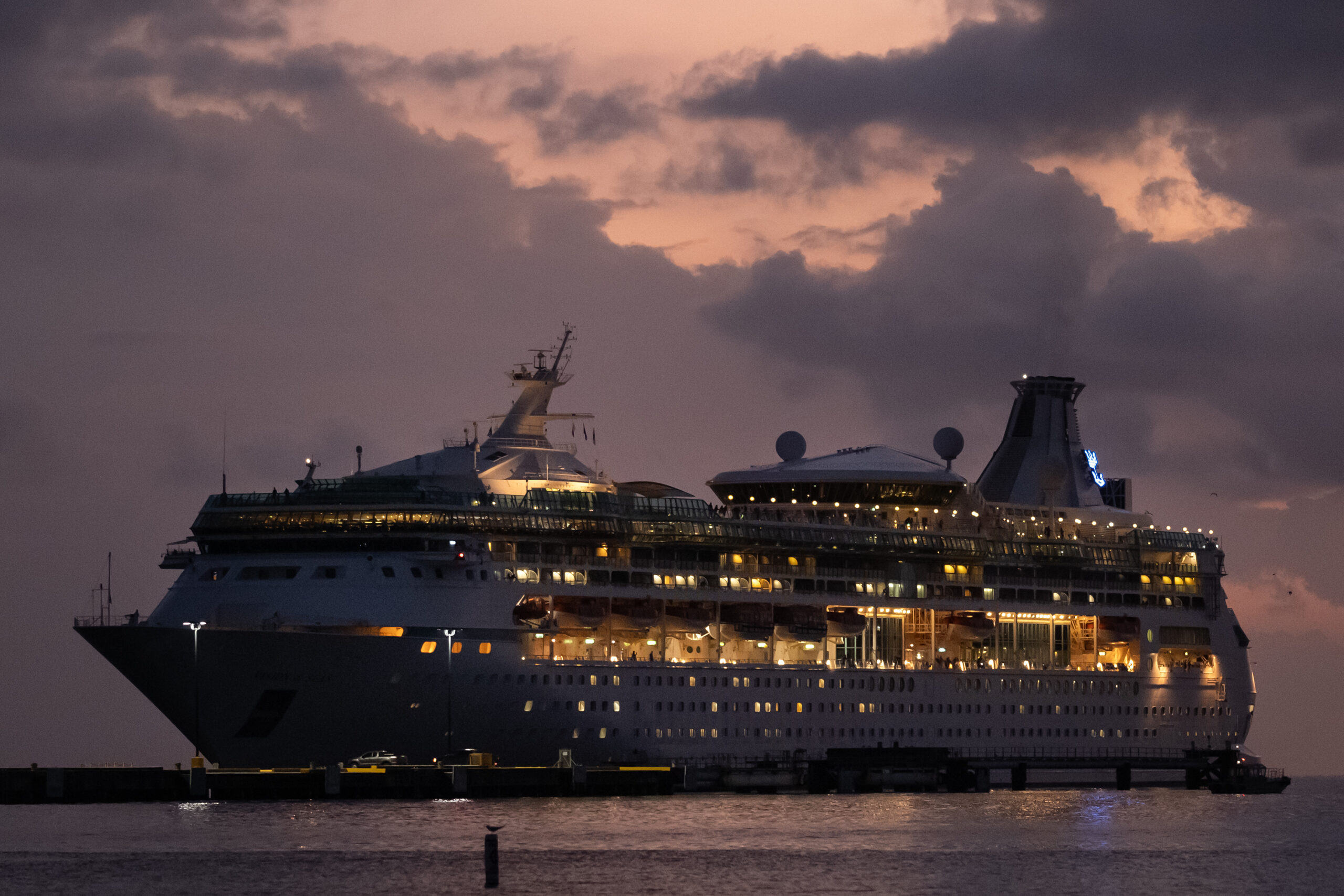
Speaking from Miami during a virtual press briefing Tuesday, Gov. Albert Bryan Jr. and V.I. Tourism Commissioner Joseph Boschulte projected continued growth in the number of cruise passengers visiting the U.S. Virgin Islands. Boschulte said the territory is expecting 1.8 million cruise travelers in fiscal year 2025.
Before turning things over to Bryan, Boschulte said the U.S. Virgin Islands had regained its “top spot” as the number one destination for spending in the eastern Caribbean and second in the Caribbean overall.
“But I think I’ll put a little asterisk on that, because we should be number one,” he said. In previous decades, Boschulte added, visitor spending looked like boxes of liquor and other goods. “Today, ‘spend’ is different. People are spending money on experiences, and as I just mentioned, we rank at the top.”
Bryan said this year’s Seatrade was particularly important because of berthing agreements. The territory entered into its first agreements in 2015 with Carnival and Norwegian at the St. Thomas’ West Indian Company Dock and Royal Caribbean at Austin “Babe” Monsanto Marine Terminal in Crown Bay. Those agreements are now up for renewal.
“And it’s important to understand that just because three lines received the berthing agreements 10 years ago, it doesn’t mean that they’re the only three lines interested in berthing agreements in the territory,” Boschulte said, adding that the territory is weighing a number of factors to find the best deals. The agreements are expected to be finalized within the next several months, he said.
Boschulte has yet to announce whether or not he accepted an offer to assume leadership of WICO as the public-private company’s next chief executive.
“He hasn’t made any decisions, but I’m really counting on him being the head of WICO when we decide to negotiate those berthing [agreements],” Bryan told the Source Tuesday.
During the briefing, Bryan highlighted the range of projects aimed, in part, at making the territory a more attractive destination, particularly on St. Croix, where cruise traffic has seen the most growth. Those projects include the rehabilitation of Mahogany Road and other scenic routes on the island, as well as the Veterans Drive rehabilitation on St. Thomas.
“So we got to make sure when they come, that they are satisfied and they’re having a good time,” he said.

Speaking to the Source, Bryan touted other incentives for cruise lines like legislation allowing them to continue operating casinos while docked in Frederiksted. During this year’s conference, Bryan said he’d had a discussion with Senate Majority Leader Kurt Vialet and Sen. Novelle Francis Jr. about resanding the entire Frederiksted beach.
“What that would do is — if you have a beach in town, you would create business opportunities for those restaurants and bars and souvenir shops in town,” he said. “Because the people not only would be able to enjoy the water, but then they could just put on a wrap or whatever and go and get something to eat.”
One counterpoint to this year’s rosy tourism forecast is the tidal wave of tariffs and port fees proposed by the Trump administration — and the impact they could have on the territory’s maritime trade. President Donald Trump has continued to threaten massive tariffs — including on goods from the nation’s closest trading partners — and the U.S. Trade Representative proposed in February steep fees on any Chinese-built vessel calling on a U.S. port. Bryan said Tuesday that the Virgin Islands government had met with Tropical Shipping CEO Tim Martin and Jennifer Nugent-Hill, the company’s government and community affairs director, about the proposed fees.
“Couple of things we wanted to clarify,” he said. “I mean, the Virgin Islands is looking pretty good in terms of being affected by tariffs, but this one could cost a ship up to a million dollars … upon docking — and of course … that’s going to be passed over to consumers.”
Bryan told the Source that the tariffs appeared to primarily impact goods imported to the United States.
“And as you know, the majority of the business to the Caribbean is one where we’re — the U.S. — is exporting products to the Caribbean, so they may not be tariffed or they may not have to pay the port fees that other ships would,” he said. “So we’re looking at that right now. We’re looking for clarification from the Trump administration.


